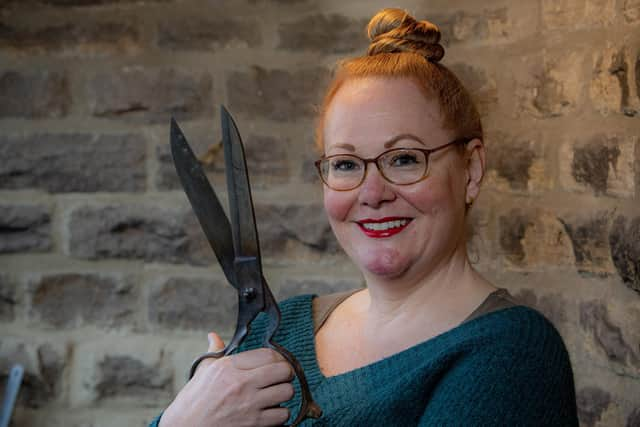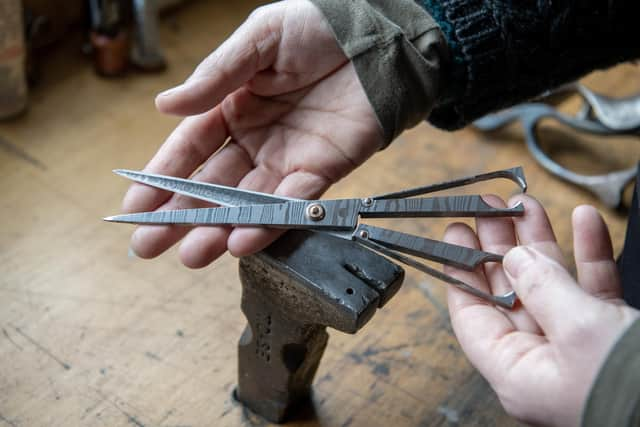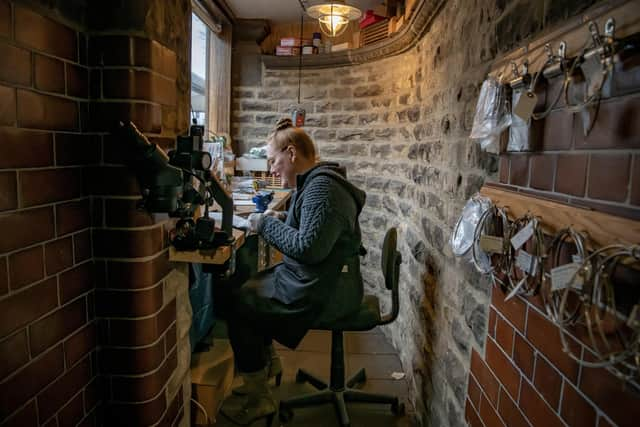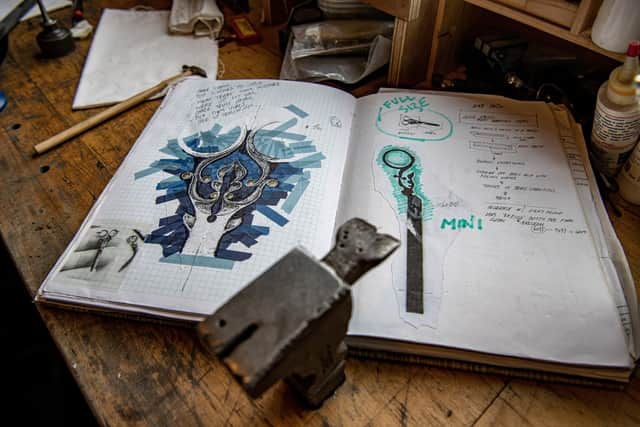Meet Grace Horne who creates beautiful, intricate scissors, knives and corsets – in a former public toilet
Grace intended studying in the industrial city, a stark contrast to her rural home in Herefordshire, but had to abandon her trip to the university campus as it was too far for her to get there and back on the train.
“So I didn’t go. I sat in Sheffield station drinking a cup of coffee and realising I wasn’t coming to Sheffield this year. Then six years later, by sheer coincidence, I came up here to do my Masters degree in metalwork and jewellery.”
Advertisement
Hide AdAdvertisement
Hide AdIt proved an opportune time for Grace, who, following her studies, was able to tap into the knowledge of some of the city’s master cutlers, among them the late Stan Shaw, who she just so happened to hear on a radio programme – then pestered him to take her on as an apprentice. “I realised there were still people in Sheffield making knives and I got terribly excited,” she says.


Having previously completed a degree in Craft Design and Textiles in South Wales, Grace had set up a workshop in London creating pewter ware, but with the lease due for renewal she set her sights on learning from the masters of her chosen trade in the South Yorkshire. Although Stan wasn’t taking on apprentices at that time, he gave Grace the guidance and support she needed. “I love pocket knives, the intricacy of the mechanism, and he sent me away with a lot of springs and blades. Over the years I kept going back to him for help.”
Grace’s degree also focused on specialist steels and modern technology involved in knife making. Being at Sheffield Hallam University, gave her access to the equipment she needed, edge tools used in the creation of folding knives as well as resources and access to allied trades in the city – all of which helped to kick-start her career. “It was invaluable and that’s why I never left because that infrastructure comes right from the engineering I use, even now. I am a craft engineer at heart and being back at the university gave me access to all that, making things for everyday use.
“The thing about folding back knives is they are useful tools. They close and sit in your pocket, being an object of beauty you are carrying around. Then about 10 years ago I decided I wanted to make multi-blade knives with scissors in.”
Advertisement
Hide AdAdvertisement
Hide AdGrace says that despite her own attempts to research how to make scissors, she hit a stumbling block with the lack of literature. “Then I realised Ernest Wright were working in Sheffield so I persuaded them to let me spend time with them in the workshop.” She says the knowledge and skills she gleaned from her experience was “life changing”.


“Part of my role is not only to make scissors but to bring together all of the stuff I have learned over the years about scissor making and the history, and get as many people interested because I think it is fascinating – there is a whole lot of folklore around it.”
Creating ornate hand-made scissors and knives as objects of beauty, as well as functionality, for the discerning customer, among them collectors, now accounts for a large part of Grace’s business which operates from a 19th century toilet block built for the convenience of male tram drivers. Working with an architect, Grace transformed the redundant building into a two-storey workshop – although evidence of its past use remains as she was keen to retain the originality.
“You can still see the old urinals, there were three. Now they are knocked back to the wall, but you can see where they were along with my favourite brick and the bit of graffiti on it,” says Grace.
Advertisement
Hide AdAdvertisement
Hide AdThe addition of the roof has created an upstairs storage area while the ground floor, measuring 3m by 3m, accommodates her work bench, lathe and milling machine. She is used to working in small spaces and was confident the building would accommodate her needs as she modelled it out in Lego.


She also appreciates that she is preserving a piece of the past. “There have been people who have knocked on my door and said they remember this place as a toilet!”
In the same way Grace is preserving the history of a building, she is also ensuring historic skills live on. Working at her workbench in the window, her craft is visible to passers-by and the curious are welcome to call in.
“What I have discovered is you need a certain number of tools, but they are all quite basic, and a lot of things I file it and cut it by hand, I do a lot of hand work and some tools have been used for the last 200 years. It’s engineering – it’s all about precision, constructing something useful relatively from basically everyday materials we have around us.”
Advertisement
Hide AdAdvertisement
Hide AdGrace’s bespoke collection is inspired by historical references, texture, shape and form. One-off pieces are crafted from steel and artisan-patterned material. Intricately crafted embroidery scissors and desk scissors range in price from hundreds to thousands of pounds for the Twisted Seamstress featuring a laced corseted design.


This echoes another string to Grace’s bow as a corsetiere. Her mum worked in textiles, weaving and spinning, and Grace’s interest in textiles developed through her studies. Predominantly she makes corsets for models on photo shoots. Other examples of her work can be found in her online collection.
Based on the corset pattern block from around 1860, when eyelets and lacing were introduced, Grace’s unique creations also embody her metalwork skills. The Twisted Corset knife, featuring double Titanium, is designed specifically as a hanging adornment, similar to a pocket watch, for the Tweed Corset jacket.
Grace also designs and makes bras, predominantly for customers seeking bespoke, larger-size lingerie. Shoes are another element of the sewing side of her business which she operates from her home studio.
Advertisement
Hide AdAdvertisement
Hide Ad“I am a very self-indulgent maker. I am driven by what gives me pleasure. I love making things and I love working with my hands. I love finding out new things and putting that information out there so other people get enthusiastic as well.”
Construction is the synergy flowing through each skillset, along with the consciousness of preserving a tradition, ensuring the legacy of metal working in Sheffield, and beyond, lives on. Attending trade shows in America where Grace regularly showcases her knives and scissors to collectors, and where she is due to host her first five-day residential scissor-making courses this year in North Carolina and New England, she is also conscious of the perception that metalworking is a male-dominated world. Yet, although many of those showcasing their work at trade shows, and the collectors attending the events, are men, she doesn’t feel she is inhabiting a man’s world. Grace is simply carrying on the baton for the women of Sheffield who played an integral part in shaping the city’s steel heritage.
“This idea of juggling domesticity life with metal work is not new – generations of women in Sheffield have done exactly that. Women were so integral to the cutlery trade and I feel there are thousands of women cheering me on. It’s not unique, it’s what has always happened.”
www.gracehorne.co.uk